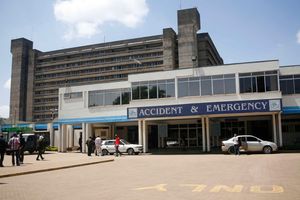
The entrance to the Accident and Emergency unit at Kenyatta National Hospital in Nairobi.
The government has moved to entrench the country’s five existing teaching, referral and research hospitals into law through a Bill that seeks to define their functions in the administration of specialised healthcare to patients.
The Health (Amendment) Bill, 2024, seeks to provide a governance and management framework for these health facilities whose current establishment is based on legal notices that expire after 10 years, as stipulated in the Statutory Instruments Act of 2013.
Through this government-sponsored Bill, Kenyatta National Hospital (KNH) whose legal notice has already expired alongside Moi Teaching and Referral Hospital (MTRH), Kenyatta University Teaching and Referral Hospital (KUTRH), Mathari National Teaching and Referral Hospital (MNTRH) and the National Spinal Injury Hospital (NSIH) will now be anchored in law.
Under the proposed legislation, these health facilities that are currently operating as state corporations will be required to receive patients on referral from other facilities within or outside Kenya for specialised healthcare and provide multi-speciality referral medical services.
This includes public and private outpatient and inpatient diagnostic services, treatment, surgical procedures and other related medical services.
“These hospitals shall continue to operate as if they had been established under the proposed law and shall forthwith be issued with a charter by the CS for Health,” the Bill currently before the National Assembly states.
“These hospitals shall also be the successors of the former hospitals and all their rights, duties, obligations, assets and liabilities existing at the commencement of the proposed law shall automatically and fully transfer to the respective facilities issued a charter under the proposed law,” it adds.
If enacted, the law will empower these referral facilities to formulate policies on several matters such as procedures for staff appointments and the types of health services to be offered at each facility.
Currently, the hospitals operate under outdated or expired legal notices lacking a robust legal framework.
Section 21 of the Statutory Instruments Act mandates that such instruments are automatically revoked 10 years after enactment unless an earlier expiry date is provided or specific exemption is granted.
In 2013, an attempt by the National Assembly to repeal this provision through the Finance Bill was nullified by the High Court which ruled that the amendments were “extraneous to a Money Bill” and thus unconstitutional as they were “passengers in the wrong vehicle.”
The new Bill addresses this gap by establishing a comprehensive legal framework for the creation and operation of the country’s referral hospitals.
Clause 3 of the Bill proposes a new section in the Health Act—dedicated to the establishment of teaching, referral, and research health facilities.
These facilities will be established through a charter published in the Kenya Gazette and will operate as body corporates with perpetual succession and powers to perform all lawful functions of a corporate entity.
According to Clause 2 of the Bill, the charter will outline the establishment and composition of the facility’s governing board, its functions, governance structure, and the powers of the board to formulate and approve operational guidelines and policies.
The Bill also seeks to amend Section 2 of the Health Act by introducing terms such as “satellite facility,” “CEO,” and “charter.”
A charter is defined as a license of operation granted to the five health facilities by the Cabinet Secretary for Health upon satisfying specific requirements.
“The CS shall, prior to granting a charter, ensure that the teaching, referral, and research health facility has complied with the provisions of this Act,” the Bill states.
A satellite hospital is defined as a health facility that is geographically separate but affiliated and administratively linked to the parent facility established under the proposed law.
Read: NPS fight MPs’ plan to slash Sh833m from police insurance to clear idle Mbagathi hospital bill
KNH, the largest referral facility in East Africa was established as a state corporation via Legal Notice No 109 of April 6, 1987, and later amended by the KNH Order of 2021. However, this notice has since expired, threatening the hospital’s legal existence.
The Moi Teaching and Referral Hospital in Eldoret was established under Legal Notice No. 78 of June 12, 1998, and updated via Legal Notice No. 56 of April 18, 2002, and Legal Notice No. 40 of March 1, 2021.
The Kiambu-based Kenyatta referral hospital transformed from a university hospital into a standalone parastatal through Legal Notice No. 4 of January 2019, with a mandate to provide specialized healthcare, medical education, and research aligned with national health goals.
Mathari National Teaching and Referral Hospital was established through Legal Notice No. 165 of 2020, designating it as a state corporation for specialized psychiatric services.
The National Spinal Injury Hospital, the only one of its kind in Kenya, was created through Legal Notice No. 109 of 1987 and amended via Legal Notice No. 38 of 2021. It serves as a referral centre for spinal injuries and contributes to medical research and education.
The Bill defines special healthcare services as the provision of advanced and targeted services by professionals with specialised training in specific medical fields. This includes the use of advanced technology, equipment, or treatment methods.
The hospitals will also be required to support medical education, training, and research, offer policy advice to the Health Cabinet Secretary and train healthcare personnel across specialities.
They will further participate in national health planning, conduct healthcare research, provide technical assistance to nearby health facilities and offer guidance on specialised health services.
The Bill outlines the powers needed for the effective performance of these functions. These include managing assets, investing surplus funds (subject to approval by the National Treasury), and levying fees for services as determined by the facility’s governing board.
The hospitals will also be empowered to enter into partnerships, receive grants, donations, or gifts, and engage in collaborations that support their mandates.






